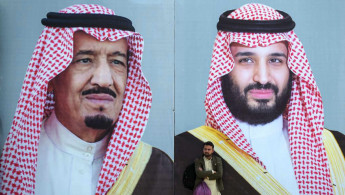Saudi Arabia becomes first Arab nation to head G20 despite human rights concerns
The G20 presidency, which Saudi Arabia takes over from Japan, will see it host world leaders for a global summit in its capital next November 21-22.
"The kingdom of Saudi Arabia assumes the G20 Presidency today, leading up to the summit in Riyadh" in 2020, the official Saudi Press Agency said.
"The Saudi G20 presidency is committed to continuing the work from Osaka and promoting multilateral consensus."
Crown Prince Mohammed bin Salman, the kingdom's de facto ruler, hailed it as a "unique opportunity" to shape international consensus, SPA added.
Saudi Arabia will host more than 100 events and conferences in the run-up to the summit, including ministerial meetings, the agency said.
"When Saudi Arabia assumes the G20 presidency, it will become the first (Arab) nation to lead this intergovernmental body," Dennis Snower, president of the think-tank Global Solutions Initiative, said in a statement.
Read more: Saudi crown prince's message is clear: Kingdom is open for business, not for political activism
"This presidency... will be challenged by a central paradox: global risks like climate change, demographic developments, such as low birth rates, rising life expectancy and aging societies… but rising populism and nationalism are preventing progress at the multilateral level."
The oil-rich kingdom has promoted a liberalisation drive, including granting greater rights to women, but faced strong criticism over a crackdown on dissent and the murder last year of journalist Jamal Khashoggi.
Rights groups have urged G20 member states to exert pressure on the kingdom over its intensifying crackdown on dissent, which has seen several women activists, journalists and political dissidents jailed.
On Monday, campaigners reported that Saudi Arabia had detained at least nine academics, writers and activists, the latest in a series of crackdowns on intellectuals over the past two years.
Activists say that some were subsequently released, but the detention of liberals - in the midst of the much-hyped liberalisation drive - underscores what observers call increasing repression and authoritarianism.
"Saudi Arabia steps up to the G20 presidency amid a new wave of arbitrary arrests of peaceful critics, with many human rights defenders still languishing behind bars, and just over a year since the horrifying killing of Jamal Khashoggi," Heba Morayef, Amnesty International's director for the Middle East and North Africa, said in a statement.
"World leaders in the G20 must pressure Prince Mohammed to ensure enjoyment of all human rights including freedoms of expression, association and peaceful assembly."
Member states who are engaged in arms trade with Saudi Arabia must also reconsider their position and the extent to which their continued profitability makes them complicit in human rights violations committed by the kingdom in its war on Yemen, Amnesty warned.
"As President of the G20, Saudi Arabia is responsible for ensuring the issues it has placed on the G20 agenda are addressed in ways which achieve the Sustainable Development Goals, including fair economic growth, tackling climate change, energy, food and water security and women's empowerment.
"How can a country with such an appalling human rights record at home ensure respect for human rights in such an important international process?,” Morayef added.
Saudi Arabia has faced intense global criticism since the brutal murder of journalist Jamal Khashoggi inside the Saudi consulate in Istanbul in October 2018.
The killing sparked unprecedented scrutiny of the kingdom's human rights record, including its crackdown on women activists, many of whom have accused interrogators of sexual harassment and torture. Saudi prosecutors deny the accusations.
Riyadh has faced pressure from Western governments to release the women, most of whom were detained in summer last year in a wide-ranging crackdown just before the historic lifting of a decades-long ban on female.
Meanwhile, Mohammed bin Salman has eased social restrictions in the conservative kingdom, allowing mixed-gender concerts and sporting extravaganzas as he seeks to open up the country to foreign tourists, while curtailing the freedom of expression.
Follow us on Twitter and Instagram to stay connected





 Follow the Middle East's top stories in English at The New Arab on Google News
Follow the Middle East's top stories in English at The New Arab on Google News
![Netanyahu furiously denounced the ICC [Getty]](/sites/default/files/styles/image_330x185/public/2024-11/GettyImages-2169352575.jpg?h=199d8c1f&itok=-vRiruf5)
![Both Hamas and the Palestinian Authority welcomed the ICC arrest warrants [Getty]](/sites/default/files/styles/image_330x185/public/2024-11/GettyImages-2178351173.jpg?h=199d8c1f&itok=TV858iVg)
